95 Years of Memories: Eye Witnesses to the 1915 Genocide
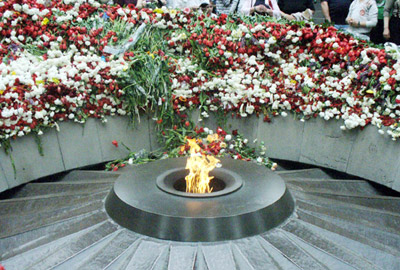 Today, there are four survivors of the 1915 Genocide left in the Armavir Marz of Armenia. We obtained information about them from the Regional Administration and paid the survivors a visit.
Today, there are four survivors of the 1915 Genocide left in the Armavir Marz of Armenia. We obtained information about them from the Regional Administration and paid the survivors a visit.
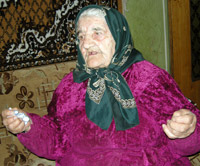 Yepraksia Gevorgyan is 104 years-old but she puts many younger people to shame with her vim and vitality. It’s hard to guess her age just by looking at her, especially when she starts reciting Hovhannes Toumanian’s “Anoush” and other poems without stopping for a breath. She even mixes in a few words in English.
Grandma Yepraksia raised five children; four girls and a boy. Her son has since died. She lives in the town of Armavir with her grandson and his family. When we visited her, Yepraksia was in the corridor having a friendly chat with another elderly lady. She had no idea why we had come to see her.
When Yepraksia spotted us, she got up, said hello and walked towards us. At first, I was a bit concerned that the 104 year-old woman would have trouble walking, but boy was I wrong.
She refused my help and walked steadfastly into the living room. She has divided up the room into her “special” areas.
She always sits on the corner of the sofa, but when she takes her coffee, she moves to the armchair. Grandma Yepraksia says she eats just about everything but prefers her coffee on the light side, never dark.
She still gets around in the kitchen and cooks. Her grandson’s wife says Yepraksia makes a delicious spas soup (tambour) that’s finger-licking good.
The grandmother said she would have prepared some of her special soup had she known we were coming. The smile on her face soon faded when we asked about her childhood.
The Araks River was red with blood
“Thank God, you never witnessed what I did, how the Turks massacred Armenians. It was terrible. Mothers were fleeing with their babies wrapped up. The Turks would bayonet the babies in the stomach and hold them up. I saw it all with my own eyes. We would hide until the Turks passed. We’d then get back on the road. We reached the Araks River. It was red with blood. We saw a clear spot. We crossed the river using rafts. I should have gone blind and not seen all they did. Again I say you are lucky a thousand fold not to have seen it all, recounted grandma Yepraksia Gevorgyan.
She was nine when her family fled the village of Marvak in the Kars region. She has never reconciled with the fact that Kars no longer is an Armenian town.
During our conversation, she noted several times that Kars was exclusively an Armenian town and that Turks were few in numbers.
Grandma Yepraksia said that when the Turks started to massacre Armenians, the family dug a few deep holes in the yard and stashed all their belongings in them in the hope that they would one day return.
When the family fled, they only took money and gold with them. She remembers that the gold they had was only enough for a few days worth of food since one loaf of bread cost one gold piece.
Grandma Yepraksia wound up in an orphanage in Gyumri. So vivid were her descriptions of the family house in Kars that you got the impression that she had just returned from there.
If I went back I would still recognize our house
“If I went to Kars I would immediately recognize our house if it’s still standing and hasn’t been altered. It first belonged to my uncle and then we lived there. Above us were the homes of my aunt. Her husband, blind in both eyes, was a troubadour. I remember a man called Vardan who had a store on our street. In the village, there were fifteen homes of our relatives. They all were killed except my mother’s brother, who survived.
Then, she started to count off the number of animals they had in their large stable.
“We had four milk cows, twenty sheep and two oxen. I remember as kids we would take the dried manure to Vardan’s store in exchange for rye. We’d cook it up and eat it,” she added.
The Turks killed her father on the road when the family fled the village. One of her father’s brothers was taken prisoner and the other was killed while in the army. The old woman says the village was exclusively Armenian.
She described in detail the spot on the Araks River where they crossed over into eastern Armenia. “It was near the station on the river,” she said.
Americans at the orphanage treated us well
Yepraksia Gevorgyan is 104 years-old but she puts many younger people to shame with her vim and vitality. It’s hard to guess her age just by looking at her, especially when she starts reciting Hovhannes Toumanian’s “Anoush” and other poems without stopping for a breath. She even mixes in a few words in English.
Grandma Yepraksia raised five children; four girls and a boy. Her son has since died. She lives in the town of Armavir with her grandson and his family. When we visited her, Yepraksia was in the corridor having a friendly chat with another elderly lady. She had no idea why we had come to see her.
When Yepraksia spotted us, she got up, said hello and walked towards us. At first, I was a bit concerned that the 104 year-old woman would have trouble walking, but boy was I wrong.
She refused my help and walked steadfastly into the living room. She has divided up the room into her “special” areas.
She always sits on the corner of the sofa, but when she takes her coffee, she moves to the armchair. Grandma Yepraksia says she eats just about everything but prefers her coffee on the light side, never dark.
She still gets around in the kitchen and cooks. Her grandson’s wife says Yepraksia makes a delicious spas soup (tambour) that’s finger-licking good.
The grandmother said she would have prepared some of her special soup had she known we were coming. The smile on her face soon faded when we asked about her childhood.
The Araks River was red with blood
“Thank God, you never witnessed what I did, how the Turks massacred Armenians. It was terrible. Mothers were fleeing with their babies wrapped up. The Turks would bayonet the babies in the stomach and hold them up. I saw it all with my own eyes. We would hide until the Turks passed. We’d then get back on the road. We reached the Araks River. It was red with blood. We saw a clear spot. We crossed the river using rafts. I should have gone blind and not seen all they did. Again I say you are lucky a thousand fold not to have seen it all, recounted grandma Yepraksia Gevorgyan.
She was nine when her family fled the village of Marvak in the Kars region. She has never reconciled with the fact that Kars no longer is an Armenian town.
During our conversation, she noted several times that Kars was exclusively an Armenian town and that Turks were few in numbers.
Grandma Yepraksia said that when the Turks started to massacre Armenians, the family dug a few deep holes in the yard and stashed all their belongings in them in the hope that they would one day return.
When the family fled, they only took money and gold with them. She remembers that the gold they had was only enough for a few days worth of food since one loaf of bread cost one gold piece.
Grandma Yepraksia wound up in an orphanage in Gyumri. So vivid were her descriptions of the family house in Kars that you got the impression that she had just returned from there.
If I went back I would still recognize our house
“If I went to Kars I would immediately recognize our house if it’s still standing and hasn’t been altered. It first belonged to my uncle and then we lived there. Above us were the homes of my aunt. Her husband, blind in both eyes, was a troubadour. I remember a man called Vardan who had a store on our street. In the village, there were fifteen homes of our relatives. They all were killed except my mother’s brother, who survived.
Then, she started to count off the number of animals they had in their large stable.
“We had four milk cows, twenty sheep and two oxen. I remember as kids we would take the dried manure to Vardan’s store in exchange for rye. We’d cook it up and eat it,” she added.
The Turks killed her father on the road when the family fled the village. One of her father’s brothers was taken prisoner and the other was killed while in the army. The old woman says the village was exclusively Armenian.
She described in detail the spot on the Araks River where they crossed over into eastern Armenia. “It was near the station on the river,” she said.
Americans at the orphanage treated us well
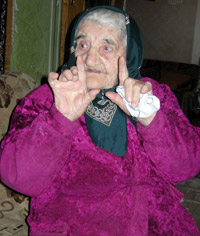 “I remember that we crossed the river and wound up in a village where we foraged for grasses and herbs to eat. Then, all those left from the village made their way to Leninakan (Gyumri). A man approached us and said his name was Askanaz Mravyan. He took us to a large building and told us to live there until things improved. We would go into town to get bread. When we passed the soldiers in the street, wearing their big hats, we’d get scared and run. One day, the soldiers caught us and gave us something to eat,” recounts grandma Yepraksia. “Then an American came to Leninakan and gathered up all the orphan kids and took us to the ‘kazach post’ orphanage.”
She says the American treated them well. They were fed four times a day, sent to school and even had a bath three times a week.
In school, the kids were taught Armenian, Russian and English. “After all these years, my English is spotty. All I remember is ‘open the door, close the door, goodbye’ and one or two other words.”
“Now when they show an American on the TV, I can tell you I never saw Americans like that. They show Negroes. The Americans I saw were quite handsome,” says the 104 year-old woman.
Yepraksia’s mother died of starvation during the family’s flight. One of her two brothers also went missing during the journey. It was only when she reached Leninakan did she realize that, out of her entire family, only her mother’s brother and one of her brothers were still alive.
Turks never change; it’s in the blood
“They took one brother as a servant. There was a family who didn’t have a son. They took him in and kept him. Later on, they married him off. We only found one another when I got married after the orphanage. He went to Yeghvard as a groom,” recounted Yepraksia. She started to get emotional when she relived those difficult years before the orphanage. “I remember it well. A bunch of us kids went to the house of a rich family. There was music coming from the house. They were having a party, eating and drinking. We knocked on the door and asked for some bread. They slammed the door on us. We turned around and left. They gave us nothing.”
We asked grandma Yepraksia if she ever wished to go back to Kars and see her childhood house and perhaps live there. “Vay, vay, no way. I’d rather beg on the streets for a morsel of bread then go back to Turkey. What are they thinking when they say they want to open the border? Do they want us to mingle together? There a saying that goes, you can become friends with a dog but never put down the stick you are carrying. They have no scruples; you can’t make friends with them. The Turks haven’t changed. It’s in the milk they drink. What is going to change in them? They took the dead bodies and were stacking them up like they were building a wall and playing the zurna in celebration,” she answered.
“I remember that we crossed the river and wound up in a village where we foraged for grasses and herbs to eat. Then, all those left from the village made their way to Leninakan (Gyumri). A man approached us and said his name was Askanaz Mravyan. He took us to a large building and told us to live there until things improved. We would go into town to get bread. When we passed the soldiers in the street, wearing their big hats, we’d get scared and run. One day, the soldiers caught us and gave us something to eat,” recounts grandma Yepraksia. “Then an American came to Leninakan and gathered up all the orphan kids and took us to the ‘kazach post’ orphanage.”
She says the American treated them well. They were fed four times a day, sent to school and even had a bath three times a week.
In school, the kids were taught Armenian, Russian and English. “After all these years, my English is spotty. All I remember is ‘open the door, close the door, goodbye’ and one or two other words.”
“Now when they show an American on the TV, I can tell you I never saw Americans like that. They show Negroes. The Americans I saw were quite handsome,” says the 104 year-old woman.
Yepraksia’s mother died of starvation during the family’s flight. One of her two brothers also went missing during the journey. It was only when she reached Leninakan did she realize that, out of her entire family, only her mother’s brother and one of her brothers were still alive.
Turks never change; it’s in the blood
“They took one brother as a servant. There was a family who didn’t have a son. They took him in and kept him. Later on, they married him off. We only found one another when I got married after the orphanage. He went to Yeghvard as a groom,” recounted Yepraksia. She started to get emotional when she relived those difficult years before the orphanage. “I remember it well. A bunch of us kids went to the house of a rich family. There was music coming from the house. They were having a party, eating and drinking. We knocked on the door and asked for some bread. They slammed the door on us. We turned around and left. They gave us nothing.”
We asked grandma Yepraksia if she ever wished to go back to Kars and see her childhood house and perhaps live there. “Vay, vay, no way. I’d rather beg on the streets for a morsel of bread then go back to Turkey. What are they thinking when they say they want to open the border? Do they want us to mingle together? There a saying that goes, you can become friends with a dog but never put down the stick you are carrying. They have no scruples; you can’t make friends with them. The Turks haven’t changed. It’s in the milk they drink. What is going to change in them? They took the dead bodies and were stacking them up like they were building a wall and playing the zurna in celebration,” she answered.
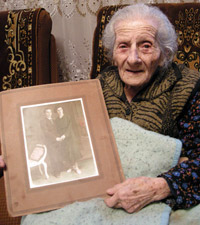 Alis Kasaryan was born in western Armenia in 1909. She now lives in the Norpat village of Armavir in her daughter’s house. When we went to visit, grandma Alis was quite animated even though she hasn’t been able to walk on her own for the past year.
But she still likes to work, even at her age. She fell and broke her leg one day while cleaning out the yard. Her daughter, Hripsik, said that before her 101 year-old mother fell she was in good health. Even today, she has no real complaints. Her heart acts up now and then, but that doesn’t stop Alis from getting around.
Grandma Alis even joked with us, saying that if it weren’t for her son-in-law, her daughter wouldn’t have taken care of her all these years. “I really love my son-in-law. His just like my son. If it weren’t for him, I wouldn’t have lived so long.”
Broke her leg while working at 100
Alis Kasaryan was born in western Armenia in 1909. She now lives in the Norpat village of Armavir in her daughter’s house. When we went to visit, grandma Alis was quite animated even though she hasn’t been able to walk on her own for the past year.
But she still likes to work, even at her age. She fell and broke her leg one day while cleaning out the yard. Her daughter, Hripsik, said that before her 101 year-old mother fell she was in good health. Even today, she has no real complaints. Her heart acts up now and then, but that doesn’t stop Alis from getting around.
Grandma Alis even joked with us, saying that if it weren’t for her son-in-law, her daughter wouldn’t have taken care of her all these years. “I really love my son-in-law. His just like my son. If it weren’t for him, I wouldn’t have lived so long.”
Broke her leg while working at 100
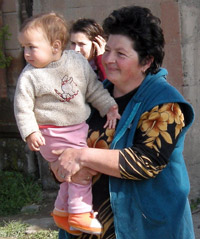 She was quite curious about the nature of our visit and kept asking why the family members were going and coming from the living room.
“Hripsik, what’s going on,” she constantly asked her daughter. Soon after, grandma Alis showed us her certificate verifying that she was a Genocide survivor. Then she took out some lace needle work and proudly showed us some of her handmade table cloths. Over the years, she has given several of her works as gifts to friends.
She learned the craft in Greece, where she wound up with her mother and brother after the Genocide. The old woman’s memory has faded and she doesn’t remember much, even the number of her family that perished during those terrible events. With her daughter’s help, Alis was able to recollect that her father, Hakob Berberian, was brutally murdered when she was only six months old.
Turks mutilated her uncle, a priest
Her father’s brother, a celibate priest, was also murdered. The Turks ripped the flesh from his body. Her mother took her and her brother, along with some relatives, out on the road of exile and to Greece, where her grandmother was living. Her mother died in Greece. Grandma Alis remembers nothing of her mother, only her name, Zarouhie.
“When we left for Greece I was eleven years-old. My uncle gave us a room to stay in. I learnt how to sew in school. I usually went straight home after classes and didn’t go out much. We would sew until midnight. My uncle would get angry and say that all that work wasn’t good on the eyes but we worked all the same,” grandma Alis said.
Later in life, that exquisite needle work would become a source of income. The old woman remembers her first handiwork. It wasn’t perfect but she got paid for it. Grandma Alis got married in Greece and had a child. Her husband went off to war and never returned.
Repatriated to Armenia in 1947
She was quite curious about the nature of our visit and kept asking why the family members were going and coming from the living room.
“Hripsik, what’s going on,” she constantly asked her daughter. Soon after, grandma Alis showed us her certificate verifying that she was a Genocide survivor. Then she took out some lace needle work and proudly showed us some of her handmade table cloths. Over the years, she has given several of her works as gifts to friends.
She learned the craft in Greece, where she wound up with her mother and brother after the Genocide. The old woman’s memory has faded and she doesn’t remember much, even the number of her family that perished during those terrible events. With her daughter’s help, Alis was able to recollect that her father, Hakob Berberian, was brutally murdered when she was only six months old.
Turks mutilated her uncle, a priest
Her father’s brother, a celibate priest, was also murdered. The Turks ripped the flesh from his body. Her mother took her and her brother, along with some relatives, out on the road of exile and to Greece, where her grandmother was living. Her mother died in Greece. Grandma Alis remembers nothing of her mother, only her name, Zarouhie.
“When we left for Greece I was eleven years-old. My uncle gave us a room to stay in. I learnt how to sew in school. I usually went straight home after classes and didn’t go out much. We would sew until midnight. My uncle would get angry and say that all that work wasn’t good on the eyes but we worked all the same,” grandma Alis said.
Later in life, that exquisite needle work would become a source of income. The old woman remembers her first handiwork. It wasn’t perfect but she got paid for it. Grandma Alis got married in Greece and had a child. Her husband went off to war and never returned.
Repatriated to Armenia in 1947
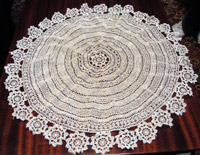 She and her husband’s relatives repatriated to Armenia in 1947. Her brother’s name wasn’t on the list of authorized repatriates so he remained in Greece. After a few letters from him, all contact was lost. Thus, the sister and brother, Genocide survivors, were never to see each other again.
Alis Kasaryan hasn’t rested easy since the hand written family tree, documenting those who perished in the Genocide and the difficult life they lead, went missing. Till this day, the old woman occasionally asks her daughter Hripsik, “whatever happened to that book?”
PS – The names of the other two survivors now living in Armavir Marz are Gyouleh Hovhannisyan, born in the village of Khanuk, Bitlis, and 100 year-old Ovsanna Safaryan.
She and her husband’s relatives repatriated to Armenia in 1947. Her brother’s name wasn’t on the list of authorized repatriates so he remained in Greece. After a few letters from him, all contact was lost. Thus, the sister and brother, Genocide survivors, were never to see each other again.
Alis Kasaryan hasn’t rested easy since the hand written family tree, documenting those who perished in the Genocide and the difficult life they lead, went missing. Till this day, the old woman occasionally asks her daughter Hripsik, “whatever happened to that book?”
PS – The names of the other two survivors now living in Armavir Marz are Gyouleh Hovhannisyan, born in the village of Khanuk, Bitlis, and 100 year-old Ovsanna Safaryan.
If you found a typo you can notify us by selecting the text area and pressing CTRL+Enter
 Videos
Videos Photos
Photos




Write a comment